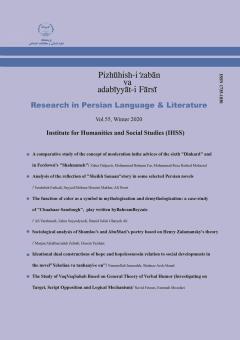Analysis of the reflection of "Sheikh Sanaan"story in some selected Persian novels
Subject Areas : Research in Iranian classical literaturesudabe farhadi 1 , mohsen hoseyni 2 * , ali noori 3
1 -
2 -
3 -
Keywords: Sheikh Sanaan, "Yekoliaa va tanhaayi-e ou", Souvashoun, Toubaa va manaay-e shab, Roud-e Raavi,
Abstract :
The story of "Sheikh Sanaan" is the story of the love of an oldholy man and his surrender to a girl of another faiththat finally leades to him questioning his own faith.This story is reflected in a considerable number of Persian novels, sometimes in the form of recreation and sometimes in the form of rewriting.The aim of the present study is to show,compare and analyze the rewrites and recreations of Sheikh Sanaan's mystical story in Persian novel, based on these for novels: "Yakoliaa va tanhaayi-e ou", "Savushoun", " Toubaa va manaay- e shab" and "Rood-e Raavi". This study shows that, like the story of Sheikh Sanaan, helplessness in love is evident in all four novels; but the characters’ reaction to the realization of their infatuation is different in each story.The exaltation of the old man's character also occurs through love in all four narratives.There are also differences in the fate of the female beloved after the occurrence of love. Except for" Yakoliaa va tanhaayi-e ou ", in the other three stories, the woman is also saved. In addition to the divine motive - to cause each of the characters to fall in love - other external and internal motives can be consideredfor the tendency of female characters to this process.In the novels "Yakoliaa va tanhaayi-e ou " and " Rood-e Raavi ", the woman is an evil element who deliberately puts herself in the path of an ascetic man, while in the other two novels, her lover has voluntarily set foot on the path of love.
پارسیپور، شهرنوش (1368) طوبی و معنای شب، تهران، اسپرک.
پورنامداریان، تقی (1376) «تفسیری دیگر از شیخ صنعان»، نامۀ فرهنگستان، شمارۀ 10، تابستان، صص 40-61.
حقوقی، محمد (1377) تاریخ ادب و ادبیات امروز ایران، تهران، قطره.
خسروی، ابوتراب (1392) رود راوی، چاپ پنجم، تهران، مرکز.
دانشور، سیمین (1349) سووشون، تهران، خوارزمی.
دهباشی، علی و مهدی کریمی (1384) شناخت¬نامۀ تقی مدرسی، تهران، قطره.
رازی، ابوالفتوح (حسین¬بن¬علی) (1303) تفسیر روض الجنان و روح الجنان، تصحیح علیاکبر غفاری، تهران، کتابفروشی اسلامیه.
زرین¬کوب، عبدالحسین (1350) «شیخ صنعان»، یغما، سال بیست و چهارم، شماره 5، صص 257-266.
ستاری، جلال (1378) پژوهشی در قصۀ شیخ صنعان و دختر پارسا، تهران، مرکز.
شیری، قهرمان (1383) «بازتاب عهد عتیق و نثر توراتی در آثار تقی مدرسی»، پژوهشهای ادبی، شمارۀ 6، صص 85-102.
صادقی، معصومه (1396) تأثیر ادبیات کلاسیک فارسی در داستان¬نویسی معاصر (با نگاهی به رمانهای سووشون، جای خالی سلوچ و آتش بدون دود)، تهران، امیرکبیر.
عطار نيشابورى، فريدالدين (1384) دیوان عطار، تصحيح تقى تفضلى، تهران، علمى و فرهنگى.
علیخانی، یوسف (1380) نسل سوم داستان¬نویسی امروز، تهران، مرکز.
مدرسی، تقی (1334) یکلیا و تنهایی او، تهران، کاویان.
میبدی، ابوالفضل رشیدالدین (1371) كشف الأسرار و عدة الأبرار، چاپ پنجم، تهران، اميركبير.
میلانی، فرزانه (1372) «پای صحبت شهرنوش پارسیپور»، ایران¬نامگ، سال یازدهم، شماره 44، صص 691-704.
همدانی، عینالقضات (1370) تمهیدات، مقدمه و تصحیح عفیف عسیران، تهران، منوچهری.

